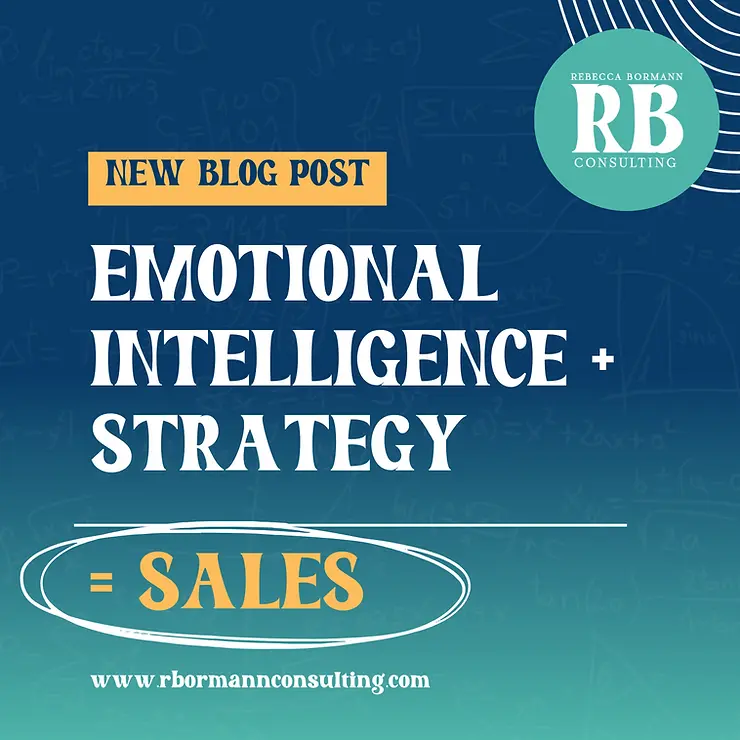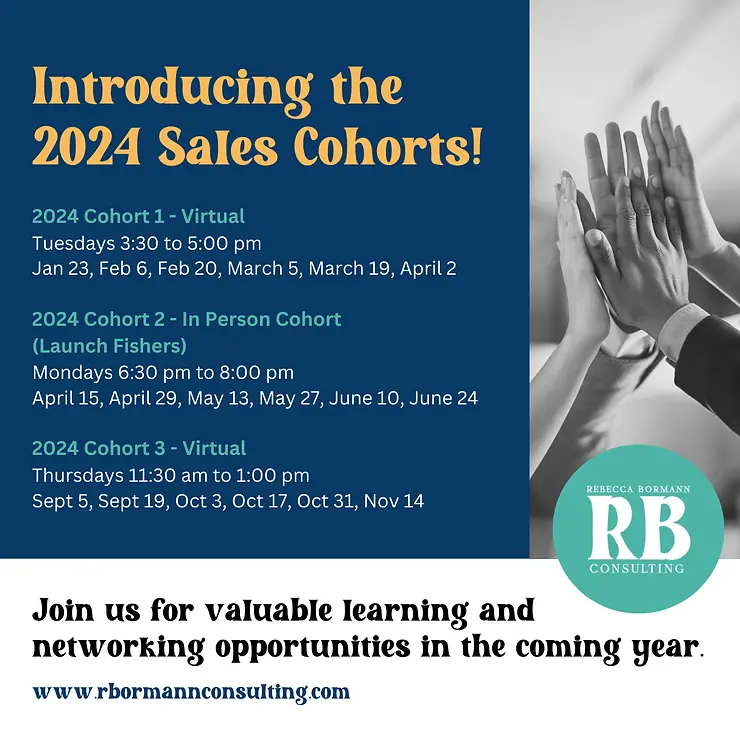

Sales is about people and how we relate to one another. In this industry, where interpersonal relationships are paramount, understanding and growing your emotional intelligence knowledge and skills can make all the difference. In this blog post, we'll explore the crucial roles that emotional intelligence and strategy play in sales and selling.
What is Emotional Intelligence? Emotional Intelligence (EQ) is often described as the ability to recognize, understand, and manage our own emotions, as well as those of others. While it's a valuable skill in many aspects of life, its importance in sales cannot be overstated.
For the sake of clarity, we’ll define strategy as a comprehensive and systematic plan of action that outlines the steps, resources, and tactics required to achieve a desired outcome. And in our case, the desired outcome is increased sales and revenue growth.
In our highly digitalized and over commoditized world it's no longer enough to just post some content on social media, show up to a few events, deliver a compelling presentation or have a stellar service or product. It's about understanding the human psyche, connecting relationally with our ideal clients and having a strategic business development plan. At RB Consulting, this philosophy forms the cornerstone of our sales consulting and training.
Why does EQ matter in sales?
EQ isn't just a buzzword; it's a game-changer. By incorporating EQ into your sales methodology, you’re empowered to connect on a deeper level with your ideal prospects and clients.
Here's how EQ contributes to sales success:
1. Empathy: EQ expands our capacity to put ourselves in our clients' shoes and understand their emotions, perspectives, and challenges. When we empathize with clients, we can better appreciate their concerns, motivations, and goals. This understanding allows us to tailor our approach and communication to meet their specific needs creating trust and value for our clients.
2. Active Listening: EQ skills emphasize active listening, which means paying full attention to what clients are saying without interrupting or rushing to respond. By actively listening, we can pick up on subtle cues, emotions, and nuances in their words, helping us gain a deeper insight into their thoughts and feelings.
3. Self-awareness: Professionals with high EQ are more self-aware, allowing them to recognize their strengths and weaknesses. This self-awareness enables them to adapt and improve continually.
4. Reading Non-Verbal Cues: Clients often convey valuable information through non-verbal cues, such as facial expressions, body language, and tone of voice. EQ skills enable us to read and interpret these cues accurately. For example, recognizing when a client is becoming frustrated or anxious can prompt us to adjust our approach or provide additional support.
5. Managing Our Own Emotions: EQ skills include self-awareness and emotional regulation. By understanding our own emotions and managing them effectively, we can prevent our own biases, stress, or reactions from negatively affecting our interactions with clients. This ensures that our responses are client-focused and empathetic.
6. Building Trust: Trust is a cornerstone of any client relationship. EQ skills help us establish and maintain trust by demonstrating authenticity, integrity, and a genuine concern for the client's well-being. Clients are more likely to open up and share their needs and concerns with individuals they trust.
7. Conflict Resolution: In client interactions, conflicts or disagreements may arise. EQ skills enable us to navigate these situations with sensitivity and professionalism. We can address conflicts calmly, seek common ground, and find mutually beneficial solutions.
8. Customized Communication: Not all clients have the same communication style or preferences. EQ skills allow us to adapt our communication to align with the client's personality and preferences. For example, some clients may prefer straightforward, data-driven discussions, while others may value more empathetic and relationship-focused conversations.
9. Anticipating Needs: By understanding clients on a deeper level, we can anticipate their needs and offer proactive solutions or support. This can lead to a higher level of customer satisfaction and loyalty.
10. Feedback Integration: EQ skills enable us to receive feedback from clients gracefully and constructively. Instead of becoming defensive, we can view feedback as an opportunity for improvement and use it to enhance our client relationships.
There are many ways to invest in your EQ skills such as, journaling to record your thoughts and feelings, helping you gain insight into your emotional patterns, mindfulness practices, asking for authentic feedback and of course studying emotional intelligence and psychology.
Much of sales and marketing practices and strategies are based on the 7 Influence and Persuasion Principles. These principles are pioneered by Dr. Robert Cialdini, an expert who’s been studying the psychology of why people say, “yes” for over three decades. Cialdini’s principles work because they are based on deep-seated psychological tendencies and behaviors that influence human decision-making. They are rooted in social psychology and have been extensively researched and observed in real-world scenarios.
You’re likely familiar with many of these principals. Before we review them, I’ll share this reminder: the principles of influence and persuasion are not about manipulation but about understanding the psychological triggers that influence decision-making. Being consciously aware of these principles allows us to embrace them in an ethical and strategic way to find our “yes” and connect with our ideal prospects and clients.
Cialdini’s 7 Influence and Persuasion Principles:
1. Reciprocity: The principle of reciprocity emphasizes giving before receiving. By offering value, whether it's in the form of information, assistance, or a genuine desire to help, professionals can trigger a sense of indebtedness in the recipients of their giving, increasing the likelihood of a positive response.
2. Social Proof: People tend to follow the crowd. Demonstrating that others have benefited from your product or service creates a sense of trust and credibility.
3. Authority: Establishing authority and expertise in your field is crucial. In practice, self-promotion of one's own expertise and authority tends to yield less impressive results compared to having other endorsements. What's intriguing, however, is that the identity of the endorsing party is of relatively little importance. Even when the individual endorsing you has a personal stake in doing so, their words of acclaim continue to enhance your capacity to influence and persuade. This is why referral programs are oftentimes an effective part of a business development strategy.
4. Commitment & Consistency: Dr. Cialdini's principle of consistency suggests that people like to be consistent with their past actions and commitments. Professionals can use this principle by obtaining small commitments from clients, gradually leading to larger ones.
5. Liking: Building rapport and genuine liking between the professional and the prospect or client can significantly influence decisions. Authentic and engaging personal and organization brands are key to a business development strategy. In a competitive marketplace, our brand can increase likability, making us memorable and laying a foundation for creating long term relationships.
It’s also important to think about your perceived authority in the marketplace when creating your personal brand and how it is tied to likeability. Perceived authority is not necessarily an objective measure of someone's qualifications or abilities but rather how others perceive their level of authority or expertise.
6. Scarcity: The fear of missing out is a powerful motivator, so powerful we’ve even created an acronym for it… FOMO. Creating a sense of urgency or scarcity around an offer that is actually limited can drive action.
That “icky” sales feeling many of us have experienced, oftentimes comes from manufactured or inauthentic scarcity to close a sale. Don’t do it. Your prospects and customers will see right through fake scarcity. Psychologically, when people believe they are experiencing scarcity as a manipulation tool our ego goes into overdrive to protect us from the potential threat of being taken advantage of or harmed.
The key to this principle is using it ethically and transparently in cases of actual scarcity.
Examples of ethically leveraging the principle of scarcity could include:
a. Limited capacity or availability of a product or service due to availability of resources or production capacity.
b. Seasonal promotions when the products/services are genuinely tied to a specific season or occasion.
c. Pre-order Bonuses: Offering exclusive bonuses or discounts to customers who pre-order a product can encourage early commitments without misleading claims about product availability.
d. Event Tickets: Selling event tickets with tiered pricing, where prices increase as the event date approaches, encourages early ticket purchases without deception.
e. Subscription Services: Many subscription-based businesses offer limited spots or early access to new features or content. As long as these limits are real and the value proposition is clear, this is an ethical use of scarcity.
f. Limited Stock: If a product genuinely has limited stock due to high demand or resource availability, businesses can inform customers of this fact. This encourages quicker decision-making without deception.
7. Unit: The more you feel part of a group, the more you allow yourself to be influenced by that group. Leveraging the psychological principle of unity in sales involves tapping into people's innate desire for belonging, identity, and connection. By incorporating elements that promote unity, you can build stronger relationships with your audience and increase engagement.
Ways to intentionally leverage the principal of unity:
Putting it All Together
Emotional Intelligence enhances our abilities to understand, connect with, and genuinely influence clients on a deeper level to help them achieve their goals and overcome obstacles. When combined with a proven business development strategy, it not only accelerates sales but also contributes to long-term revenue growth by building strong relationships, improving communication, and fostering adaptability and resilience in the sales process. Coupling EQ + Strategy in your sales and business growth methodology empowers you to positively influence a broader spectrum of ideal clients, creating thriving sales and organization growth.
Check back later this month for our blog post on business development strategy best practices.
Until then, what are your thoughts on the role of emotional intelligence and influence in sales? Share your experiences and insights in the comments below, and let's continue the conversation. Like and share this blog post to spread the knowledge and empower more professionals to succeed!
There’s More Than Enough,
Rebecca

More about RB Consulting:
RB Consulting, prides itself on delivering expert sales strategy, training, and consulting services to organizations ready to accelerate their growth and their impact.
We operate on the philosophy of 'lifting while climbing.' Our approach intertwines emotional intelligence (EQ) with strategic planning, enabling us to provide top-notch sales consulting and training services that are not just strategy-oriented but also people-focused.
Our goal is to meet you where you are at and take you where you want to go!
Let’s talk about sales and revenue growth for our organization.
Schedule your complimentary consultation call today: https://calendly.com/rbbizdevconsulting/rb-consulting-introductory-consultation-meeting
Sales & Marketing Consulting Areas of Expertise:
Sales & Growth Strategy & Execution
Nonprofit Fundraising and Development Strategy
Upcoming Cohorts & Workshops
If learning more about the tools of influence and persuasion and leveling up your sales skills is an area you are looking to invest in for professional and personal development, check out our 2024 Sales Training Cohorts.
We have 3 options for you to attend this year and enrollment is open for all three right now.
Sales Cohort | Rebecca Bormann Consulting (rbormannconsulting.com)


Join us for our last “How to See More in 2024” Workshop on February 3rd from 10 am to noon at Launch Fishers hosted by RB Consulting & The Kind Lady Speaks, Talks & Tools
Unlock tools & insights to maximize your year. Elevate, broaden, & ignite your vision!
Register: How to See More in 2024 hosted by RB Consulting & The Kind Lady Speaks, Talks & Tools | RB Consulting (rbormannconsulting.com)